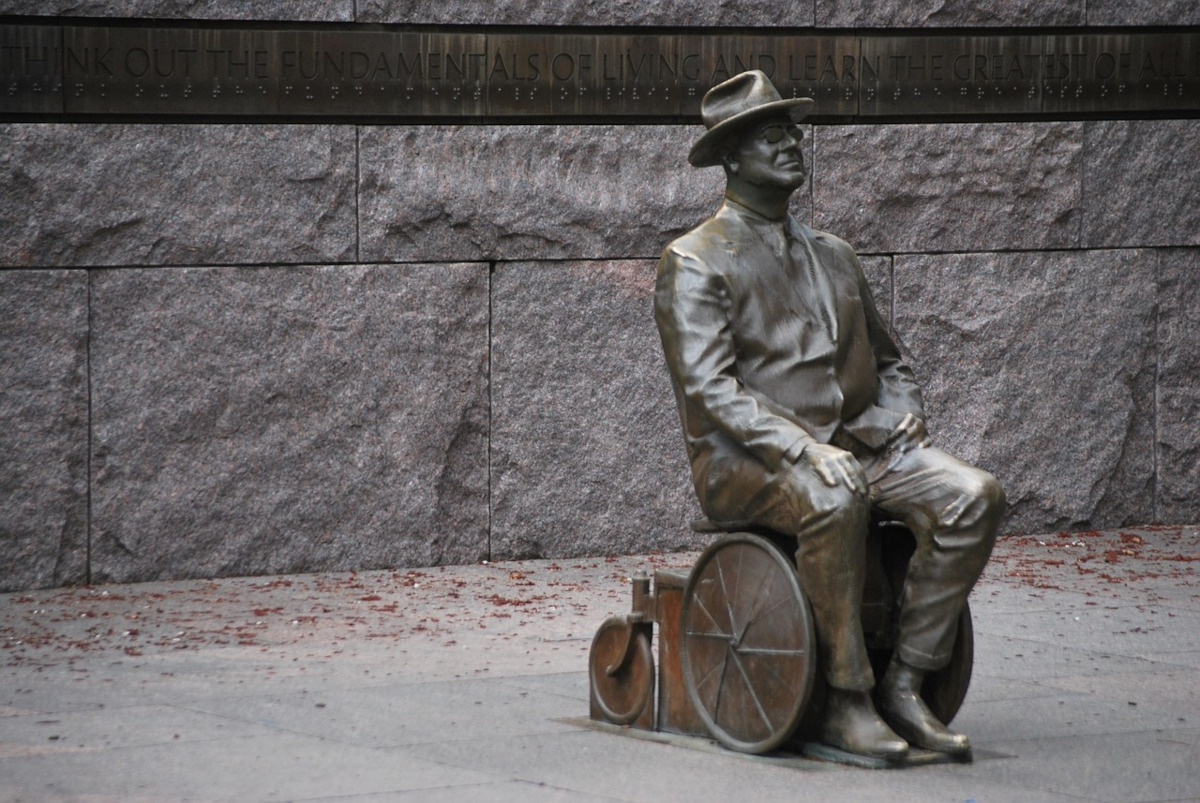Franklin D. Roosevelt: 32nd President of the USA
Franklin D. Roosevelt, often known by his initials FDR, was the 32nd president of the United States, serving from 1933 until his death in 1945.
He is the only president to have been elected to four terms in office.
His leadership during two of the most turbulent periods in American history—the Great Depression and World War II—established him as a central figure in 20th-century American politics.
Here are some key points about FDR’s life and presidency:
Table of Contents
Early Life and Career
Born in 1882 in Hyde Park, New York, Roosevelt belonged to a prominent family.
He attended Harvard College and Columbia Law School.
In 1905, he married Eleanor Roosevelt, a distant cousin and a niece of President Theodore Roosevelt.
Struggle with Polio
In 1921, Roosevelt contracted polio, which left him permanently paralyzed from the waist down.
He never regained the use of his legs, though he made substantial efforts to hide his disability from the public.
Political Ascension
Roosevelt served as the Assistant Secretary of the Navy under President Woodrow Wilson.
He ran as James M. Cox’s vice-presidential candidate in the 1920 election, which they lost.
In 1928, Roosevelt was elected Governor of New York, a position that raised his national profile.
Election to the Presidency
FDR was elected as the 32nd President of the United States in 1932, defeating incumbent Herbert Hoover.
His promise of a “New Deal” for the American people resonated with voters suffering from the Great Depression.
Roosevelt would be re-elected three more times (in 1936, 1940, and 1944), making him the only U.S. president to serve more than two terms.
Domestic Policies and Achievements
- The New Deal: In response to the Great Depression, FDR implemented the New Deal, a series of programs, public work projects, financial reforms, and regulations. These initiatives aimed to provide immediate economic relief and bring about long-term financial stability. Some of the key programs included the Civilian Conservation Corps (CCC), the Works Progress Administration (WPA), and the Social Security Act.
- Social Security Act: Established in 1935, this act created a social insurance program designed to pay retired workers age 65 or older a continuing income after retirement.
- Wagner Act: This 1935 act helped to promote the rights of workers to form unions and engage in collective bargaining.
International Policies and Events
- World War II: FDR led the United States through the majority of World War II, initially adopting a policy of neutrality before supporting Allied nations through the Lend-Lease program. Following the Japanese attack on Pearl Harbor in 1941, the US formally entered the war, aligning with the Allies to fight against the Axis powers.
- The Atlantic Charter: Along with British Prime Minister Winston Churchill, Roosevelt outlined the goals for the post-war world through the Atlantic Charter, which emphasized self-determination, economic collaboration, and disarmament of aggressor nations.
- United Nations: FDR was a proponent of the establishment of a new international body to maintain peace, which would later become the United Nations. Although he did not live to see its creation, his vision and groundwork were instrumental in its formation.
Death
Roosevelt died in office in 1945, during his fourth term, from a cerebral hemorrhage.
He was succeeded by Vice President Harry S. Truman.
Legacy
FDR’s legacy is vast and multifaceted.
While he has been praised for his leadership during the Great Depression and World War II, he has also faced criticism, particularly for his decision to intern Japanese Americans during the war and for attempting to “pack” the Supreme Court in the 1930s.
Regardless, he remains one of the most studied and discussed U.S. presidents.
Notable Quotes
Some of FDR’s most famous words include: “The only thing we have to fear is fear itself” and “Freedom of speech and expression, freedom of worship, freedom from want, and freedom from fear” (often referred to as the “Four Freedoms”).
Weekly Popular
Newsletter
Subscribe to our newsletter to stay up-to-date on our latest news and announcements.







